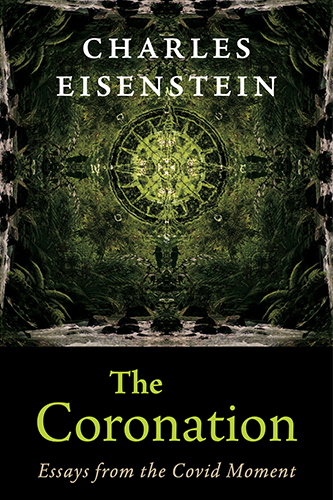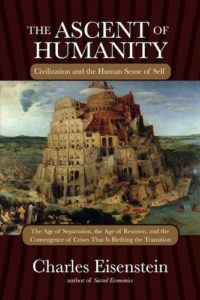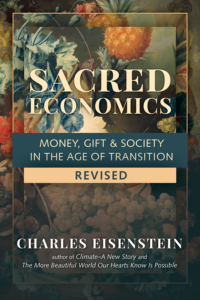Climate — A New Story
Chapters
Chapter 7: The Revolution is Love
In a Rhino, Everything
A couple years ago I received the following email from a young woman, a student at an elite law school.
I don’t cry very often. But this week I cried twice. For the rhinos. It breaks my heart that they’re going extinct. In order to make myself feel better, I try to intellectualize this. It’s totally irrational, I say to myself, to be sad for the rhinos. Why not be sad for the fairy shrimp, going extinct right here in Southern California?
There are so many things to be sad about: police shootings, for example. Right now I’m writing a memo on what constitutes excessive force during arrest and when you type in excessive force and qualified immunity to Westlaw, more than 600,000 cases come up. These cases represent a tiny fraction of incidents with police brutality; far more go unreported or are never litigated. We have a police violence epidemic in this country. I could be sad about that. And here I am reading these cases―and it’s awful (the tasing, the shooting, the beating, the pepper spray, the long term injuries, the easiness of getting out of excessive force charges) and I never cry.
And then I read some articles about the last, aging, white rhinos in zoos around the world and I fall to pieces. How can we have failed so badly? And you’re right Charles, it’s grief for the dying biosphere (I have long since stopped equating the environmental crisis with global warming, and I hate it when people do that).
There’s this kid in my class who really gets under my skin. He says annoying things like, “I love it when I see pictures of McDonald’s in other countries, or African kids wearing Nikes, because it’s like we’ve won. Our culture is supreme.” I gave him a look when he said this. And he knows how I think because we’ve had conversations, so he said, “I can’t help it, I’m pro-American.” And I said, “I’m pro-biosphere.” And he says, “I think we should only keep the animals that we need to survive.” And I’m so shocked by this stupidity that I’m rendered speechless. I literally couldn’t talk to him for a few minutes. I didn’t want to talk to him. I felt a little nauseous. Finally, I said, “I don’t think that’s possible.” And he said, “Well, we can try.” Like it’s a good thing to try for. He gives me a panicky feeling because I think what if he’s right? What if the future just contains concrete with cows, pigs, chickens, and their shit? What would we do with all their shit? (Previously he has told me that he could never care for an animal, that an animal’s suffering has no effect on him.)
I’m really trying not to other him. I sat next to him in class this semester because I know I have something to learn from him. I try to be kind to him, even though the things he says make me ill. And it’s not from a place of moral purity either. I’m trying to understand this behavior, this kind of thinking, because if I never understand it I’ll never be able to confront it in a meaningful way. It’s a challenge, though. Sometimes I feel my innate snarkiness rising to the surface, but I know this is just a defense mechanism on my part. Any suggestions?
The scariest thing about this kid is that he’s totally pro-carbon controls. He believes in global warming and that it’s a threat and that we should do something about it. I would prefer a climate change denier with a love for animals. Really, I would.
There’s something, though, besides grief. The grief is compounded by that horrible sense of helplessness. I feel like I have absolutely no control over the fate of the rhino. I do my work, you know? I made all A’s last semester … I’m disciplined. I’m studious. But I’m not doing anything real.
Like this young woman, I do not know why some tragedies penetrate me with grief while others do not. There are endless things to weep for. Because we cannot weep for each one that comes across our awareness, we might form emotional calluses just in order to function. And then from time to time something pierces those calluses, and all the other unmourned tragedies follow it through the breach. Sometimes, therefore, it is a seemingly tiny thing that brings me to tears or heart-wrenching agony: a parent shaming a two-year-old child. Or it could be a heartbreaking injustice visited on the innocent: a child marooned in this country when her parents are deported. Or it could be a single incident of brutality out of millions that gets under my skin. Each of them represents the rest. In fact, each contains the rest. Next time you travel to another planet and see caged wild animals there going extinct, you will know that planet also warehouses its elderly in nursing homes. A world in which the last white rhinos are aging in zoos is also, necessarily, a world of incarceration, war, racism, poverty, and ecocide. It is impossible for one to exist without the others. All are part of the same unholy matrix.
Because each of these contains the others, when we grieve one of them we grieve them all. It doesn’t matter if it is the rhinos or police brutality that pierces you. They are all expressions of the same underlying mythology: the story of a discrete and separate self in a desacralized world that is other.
If you take for granted a universe of standard building blocks, devoid of the qualities of a self, devoid of an inherent intelligence or evolutionary will, then our license to manipulate nature and materiality suffers no limit except for that posed by perverse unintended consequences that we can, in principle, predict and control with just a little more information and technological know-how. Why not, then, keep only the animals that are useful to us? In the Story of Separation, we are fundamentally separate from the rhinos. What happens to them needn’t affect us, outside the realm of mushy sentimentality.
The same goes for the biosphere as for the rhinos. In the Story of Separation, what happens to the biosphere needn’t affect us, except as a temporary practical matter pending the technology to make us independent of nature. That is the world of concrete and pig shit that my friend dreads.
Here is why her observation that she would prefer an animal-loving climate change denier to this person rings true. Love violates the Story of Separation. Love is the expansion of self to include another, whose well-being becomes part of one’s own. The healing of our planet will not come without love for our planet. The animal-lover, at least, is on the right track.
If we want to change the minds of people like the woman’s classmate, head-on debate isn’t going to work. No one can logically persuade somebody to fall in love. We might be able to convince them to support one policy over another on utilitarian grounds, but engaging the planet as an instrument of our utility is what has gotten us into this mess to begin with. It reminds me of the “pragmatic” opponents of the Vietnam War and Iraq War who didn’t question war as a tool to promote American interests (nor did they question the concept of American interests), but who merely said that this particular war wasn’t working. The door to more war remained open. Similarly, when we say, “Let’s stop using fossil fuels or we’re screwed,” and adopt anthropocentric interest as our primary argument, there is little to say for the rhinos. Will we be “screwed” if they go extinct? Probably not. And so we proceed toward a world of concrete and shit, with maybe a few parks for aesthetic relief.
Why would this man and millions like him be attracted to the Story of Separation that seeks to exploit and manipulate the world? Maybe it has something to do with he himself feeling like an instrument, exploited and manipulated. He is in the same position that he wishes to put the animals and the planet. Lacking real sovereignty, he longs for a sense of control. Humanity (as a proxy for the self) being in control of things feels good to him. Not to psychoanalyze the poor guy, but if we are serious about changing the beliefs that drive ecocide (rather than gaining the psychological gratification of winning an argument) it is important to understand the experience of life behind those beliefs. Ideology and psychology are inseparable.
I think this young woman is therefore on the right track, showing him kindness while not allowing herself to be dominated by him. In a worldview of winning and losing, no one will go out of their way to serve your interests unless you dominate them, force them, pay them. In its extreme, that world has no love, no real kindness, no generosity that isn’t a device to get more. That is why unforced kindness and generosity have the power to puncture the Story of Separation.
The kindness my friend shows her classmate and the desire to understand his experience of the world translate onto the level of systems and politics. What is the story our opponents stand in, the perpetrators, the ones we want to blame? What kind of life experience attracts them to that story? What are the secret ways that it lives in ourselves? When we know what it is like to be them, we will be far more capable of disrupting the narrative armature of the world-destroying machine. This is called compassion. It isn’t a substitute for strategy and action. It illuminates new strategies and makes action more effective, because we can target them at the deep causes rather than forever battling the symptoms.
What is it like to be a rhino? To be a policeman? A corporate executive, a terrorist, a killer? What is it like to be a river? These questions arise naturally in the Story of Interbeing, which holds us as interdependent on every level, even that of basic existence. They are not mere psychological questions; they are also economic and political questions, because it is these systems that generate much of our experience of life.
The lens of interbeing also relieves the helplessness the woman speaks of at the end of her email. Even as the crises of the world each contain the others in an “unholy matrix,” the same is true for the responses. To respond to any is to respond to all. I imagine myself talking to a rhino in a cage. She asks me, “What were you doing with your life, while I was going extinct?” If I answer her, “I was working to save the coral reefs,” or “I was helping to stop the navy from using whale-deafening sonar,” or “I spent my life trying to free men from death row,” then she is satisfied, and so am I. We both know that, somehow, all of these endeavors are in service to the rhinos too. I can meet her gaze without shame.
This is something that the entire spectrum of climate change positions, from skepticism to catastrophism, misses. A world in which babies are separated from mothers at birth, in which children are medicated to make them pay attention in school, in which we drain swamps and discharge toxic waste, in which human trafficking runs rampant, in which animals are confined in feedlots, in which punishment is mistaken for justice, in which wealth concentrates in ever fewer hands, and in which people hate each other because of the color of their skin, is necessarily a world where the climate is spinning out of balance. And these are not just signs, they are causes. That means that someone working to end the criminal punishment system is also helping to heal the climate. The causal link between criminal punishment and climate is probably beyond our understanding, but somehow each recognizes the other as an ally. Only in the disconnected worldview that spawns carbon reductionism can we think that climate change is somehow separable from everything else I have named.
In the Story of Interbeing, what happens to anything happens in some way to everything. We are free then to listen to what calls forth our passion, our care, and our gifts, whether the need that calls them seems large or small, consequential or invisible. Because each contains all, we can be peaceful in our fervor and patient in our urgency.






